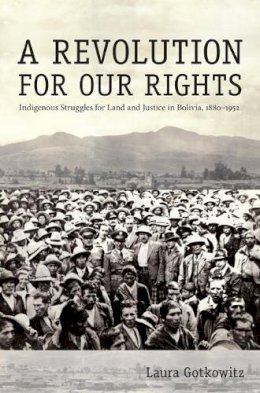
Stock image for illustration purposes only - book cover, edition or condition may vary.
A Revolution for Our Rights: Indigenous Struggles for Land and Justice in Bolivia, 1880–1952
Laura Gotkowitz
€ 52.09
FREE Delivery in Ireland
Description for A Revolution for Our Rights: Indigenous Struggles for Land and Justice in Bolivia, 1880–1952
Paperback. Providing a re-assessement of the cause of Bolivia's 1952 revolution, this book argues that the revolution had deeper roots in the indigenous struggles for land and justice that swept through Bolivia during the first half of the twentieth century. It demonstrates that rural indigenous activists helped shape populist projects of 1930s and 1940s. Num Pages: 416 pages, 26 b&w photos, 4 maps. BIC Classification: 1KLSL; HBTV; JFC; JFSL9; JPWQ. Category: (P) Professional & Vocational. Dimension: 5983 x 3971 x 25. Weight in Grams: 581.
A Revolution for Our Rights is a critical reassessment of the causes and significance of the Bolivian Revolution of 1952. Historians have tended to view the revolution as the result of class-based movements that accompanied the rise of peasant leagues, mineworker unions, and reformist political projects in the 1930s. Laura Gotkowitz argues that the revolution had deeper roots in...
Read moreProduct Details
Format
Paperback
Publication date
2008
Publisher
Duke University Press
Condition
New
Number of Pages
416
Place of Publication
North Carolina, United States
ISBN
9780822340676
SKU
V9780822340676
Shipping Time
Usually ships in 7 to 11 working days
Ref
99-1
About Laura Gotkowitz
Laura Gotkowitz is Associate Professor of History at the University of Iowa.
Reviews for A Revolution for Our Rights: Indigenous Struggles for Land and Justice in Bolivia, 1880–1952
“A Revolution for Our Rights is a major contribution to studies of Andean history and anthropology and to studies of indigenous and popular politics in Latin America as a whole. In this exciting and powerful study, Laura Gotkowitz illuminates modern Indian political engagements in what is today the most indigenous country in the Americas.”—Sinclair Thomson, author of We Alone Will...
Read more